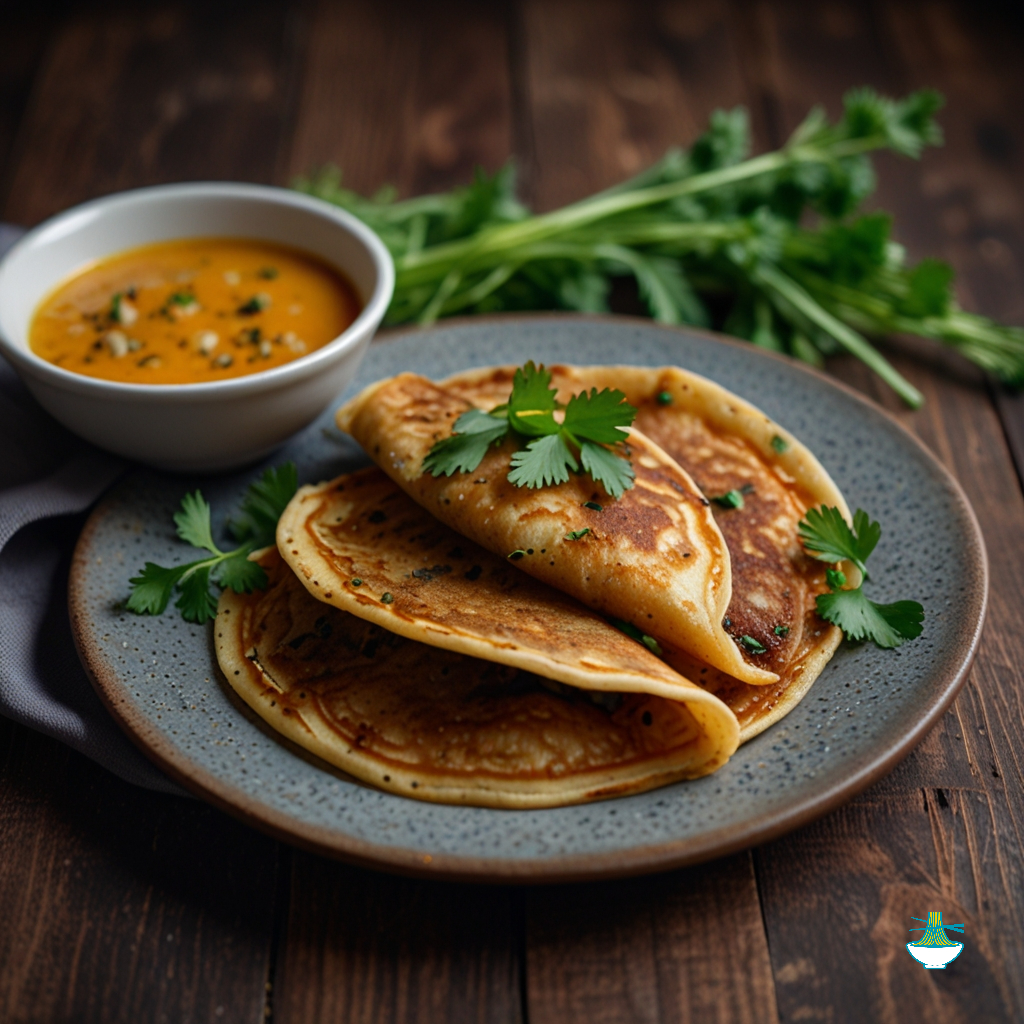Kutabi is a traditional Azerbaijani dish consisting of thin pancakes filled with minced meat, fragrant herbs like cilantro and dill, and sometimes pumpkin. These savory pancakes are pan-fried until crispy and golden, creating a delightful contrast of textures. Kutabi is typically served with yogurt or sour cream, adding a creamy element to the dish. 
The origins of kutabi date back centuries in Azerbaijani cuisine, with variations found across the region. It has been a staple dish in Azerbaijani homes and is often enjoyed during celebrations and gatherings. The combination of savory fillings encased in a thin, crispy pancake showcases the culinary expertise and rich flavors of Azerbaijani cuisine.
Ingredients:
- 2 cups all-purpose flour
- 1 cup water
- 1/2 lb minced meat (beef or lamb)
- 1 small onion, finely chopped
- 1/4 cup fresh cilantro, chopped
- 1/4 cup fresh dill, chopped
- 1/2 cup pumpkin, grated (optional)
- Salt and pepper to taste
- Vegetable oil for frying
- Yogurt or sour cream for serving

Method:
1. In a mixing bowl, combine the flour and water to make a smooth dough. Cover and let it rest for 30 minutes.
2. In another bowl, mix together the minced meat, chopped onion, cilantro, dill, grated pumpkin (if using), salt, and pepper.
3. Divide the dough into small balls and roll each ball into a thin circle on a floured surface.
4. Place a spoonful of the meat mixture onto one half of each circle, leaving a border around the edges.
5. Fold the other half of the circle over the filling to create a half-moon shape and press the edges firmly to seal.
6. Heat a skillet over medium heat and add a small amount of vegetable oil.
7. Cook the kutabi in the skillet for 2-3 minutes on each side, or until golden brown and crispy.
8. Serve hot kutabi with yogurt or sour cream on the side. Enjoy your delicious Azerbaijani treat!
Nutrition Value:
1. All-Purpose Flour (2 cups)
- Calories: Approximately 800 kcal
- Carbohydrates: Approximately 170g
- Protein: Approximately 20g
- Fat: Approximately 2g
- Sodium: Minimal
- Cholesterol: None
- Vitamins & Minerals: Contains small amounts of iron, calcium, and B vitamins.
- Nutritional Benefit: Provides energy from carbohydrates and a modest amount of protein. Contains some essential vitamins and minerals.
2. Water (1 cup)
- Calories: 0 kcal
- Carbohydrates: 0g
- Protein: 0g
- Fat: 0g
- Sodium: 0mg
- Cholesterol: 0mg
- Vitamins & Minerals: None
- Nutritional Benefit: Essential for hydration and helps with the formation of the dough without adding extra calories.
3. Minced Meat (1/2 lb, beef or lamb)
- Calories: Approximately 600-700 kcal (varies depending on meat and fat content)
- Carbohydrates: 0g
- Protein: Approximately 50-60g
- Fat: Approximately 40-50g
- Sodium: Varies
- Cholesterol: Varies (usually high)
- Vitamins & Minerals: Contains iron, zinc, and B vitamins.
- Nutritional Benefit: Excellent source of high-quality protein, iron, and zinc. However, it can be high in saturated fats and cholesterol.
4. Onion (1 small, finely chopped)
- Calories: Approximately 30 kcal
- Carbohydrates: Approximately 7g
- Protein: Approximately 1g
- Fat: 0g
- Sodium: Approximately 2mg
- Cholesterol: 0mg
- Vitamins & Minerals: Rich in vitamin C, vitamin B6, and potassium.
- Nutritional Benefit: Provides flavor and texture. Onions are low in calories and rich in antioxidants, vitamins, and minerals.
5. Cilantro (1/4 cup, chopped)
- Calories: Approximately 1-2 kcal
- Carbohydrates: Approximately 0g
- Protein: Approximately 0g
- Fat: 0g
- Sodium: Minimal
- Cholesterol: 0mg
- Vitamins & Minerals: Excellent source of vitamin K, vitamin A, and antioxidants.
- Nutritional Benefit: Adds fresh flavor and aroma. Cilantro is rich in antioxidants and may have anti-inflammatory properties.
6. Dill (1/4 cup, chopped)
- Calories: Approximately 5-10 kcal
- Carbohydrates: Approximately 1-2g
- Protein: Approximately 0g
- Fat: 0g
- Sodium: Minimal
- Cholesterol: 0mg
- Vitamins & Minerals: Good source of vitamin A, vitamin C, and manganese.
- Nutritional Benefit: Adds a unique flavor and fragrance. Dill is rich in vitamins and minerals and may have digestive benefits.
7. Pumpkin (1/2 cup, grated)
- Calories: Approximately 15-20 kcal
- Carbohydrates: Approximately 4-5g
- Protein: Approximately 0.5g
- Fat: 0g
- Sodium: Minimal
- Cholesterol: 0mg
- Vitamins & Minerals: Rich in vitamin A, vitamin C, and potassium.
- Nutritional Benefit: Adds sweetness and moisture. Pumpkin is low in calories and rich in vitamins, minerals, and antioxidants.
8. Salt and Pepper to Taste
- Calories: Minimal
- Carbohydrates: 0g
- Protein: 0g
- Fat: 0g
- Sodium: Depends on the amount used
- Cholesterol: 0mg
- Vitamins & Minerals: None
- Nutritional Benefit: Enhances flavor. While high sodium intake should be limited, salt in moderation is essential for proper bodily functions.
9. Vegetable Oil for Frying
- Calories: Approximately 120 kcal per tablespoon (varies depending on the type of oil)
- Carbohydrates: 0g
- Protein: 0g
- Fat: Approximately 14g
- Sodium: Varies
- Cholesterol: 0mg
- Vitamins & Minerals: Depends on the type of oil (e.g., olive oil contains vitamin E)
- Nutritional Benefit: Provides fat for frying and adds flavor. Healthier options like olive or avocado oil offer beneficial monounsaturated fats.
10. Yogurt or Sour Cream for Serving
- Calories: Approximately 60-120 kcal per 1/4 cup (varies depending on the type and fat content)
- Carbohydrates: Approximately 2-4g
- Protein: Approximately 2-3g
- Fat: Approximately 4-10g
- Sodium: Varies
- Cholesterol: Varies
- Vitamins & Minerals: Contains calcium, vitamin D, and probiotics (in yogurt).
- Nutritional Benefit: Adds creaminess and tanginess. Yogurt and sour cream provide calcium, protein, and beneficial bacteria (in yogurt) for gut health.
These values are approximate and can vary based on factors such as serving size, specific ingredients used, and cooking methods.


Comments